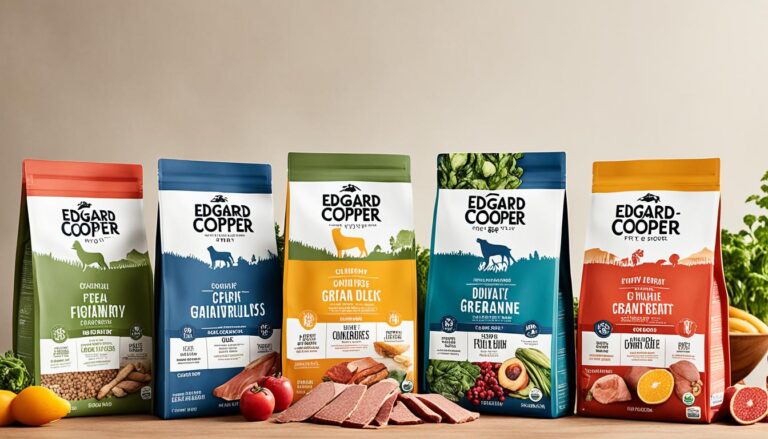Best Diet Tips for German Shepherds: What to Feed
Did you know that German Shepherds are highly susceptible to health issues when they are not fed a proper diet? Their nutritional needs are distinct, and providing them with the right food is crucial for their well-being and quality of life.
German Shepherds thrive on a natural, raw food diet that replicates what their wild ancestors, undomesticated wolves, would eat. Feeding them kibble, even grain-free options, can strain their digestive system and increase the risk of serious health conditions. Opting for a raw diet, which includes high-quality protein, healthy fats, vitamins, minerals, and fiber from vegetables and berries, provides the best nutrition for German Shepherds.
In this article, we will explore the best diet tips for German Shepherds, including what to feed them, how to choose the right food, and how to transition them to a raw diet. By following these guidelines, you can ensure that your German Shepherd is getting the nutrition they need to thrive and live a long, healthy life.
Choosing the Right Food for Your German Shepherd
When selecting the best food for your German Shepherd, it is important to consider their unique nutritional needs. German Shepherds are working dogs and require high-quality foods to maintain optimum health, strength, and endurance. The ideal base diet for German Shepherds includes a blend of beef, wheat, and leafy greens like cabbage and alfalfa. These ingredients provide the necessary nutrients and fiber to support their digestive health. It is also crucial to avoid fish, soy, or rice in their diet. Additionally, adding specific nutritional supplements like Vitamin A, B, D, E, calcium, copper, and zinc can further enhance the overall health of your German Shepherd. Feeding a breed-specific diet that meets their nutritional needs is essential for their well-being.
Important Nutritional Considerations
German Shepherds have specific nutritional requirements that must be met to ensure their well-being. Here are some important factors to consider when choosing the right food for your German Shepherd:
- Protein: German Shepherds require a diet high in protein to support their active lifestyle. Look for dog foods that contain high-quality sources of protein like beef, chicken, and lamb.
- Fiber: Adequate fiber is essential for maintaining healthy digestion in German Shepherds. Foods that contain wheat and leafy greens provide a good source of fiber.
- Avoid Allergens: German Shepherds can be prone to food allergies. Avoid common allergens like fish, soy, or rice to prevent allergic reactions and digestive issues.
- Supplements: Adding specific nutritional supplements like Vitamin A, B, D, E, calcium, copper, and zinc can support your German Shepherd’s overall health and strengthen their immune system.
To ensure you’re making the right choice for your German Shepherd’s diet, consult with your veterinarian or a canine nutritionist who can provide personalized guidance based on your dog’s specific needs and health condition.
| Benefit | Recommended Foods |
|---|---|
| Protein Source | Beef, Chicken, Lamb |
| Fiber Source | Wheat, Leafy Greens |
| Avoid Allergens | Avoid Fish, Soy, Rice |
| Nutritional Supplements | Vitamin A, B, D, E, Calcium, Copper, Zinc |
Transitioning to a Raw Diet for German Shepherds
Transitioning your German Shepherd to a raw diet can have numerous health benefits. Raw food provides essential nutrients in their most natural form, making it easier for dogs to digest. If you’re considering this diet change, there are a few important steps to follow.
To begin, we recommend purchasing a commercially prepared raw food that is specifically formulated for German Shepherds. These diets are carefully balanced to provide all the essential nutrients your dog needs. Alternatively, if you’re comfortable handling and preparing raw meat, homemade raw diets can be a great option. Just make sure to follow a recipe or consult with a canine nutritionist to ensure the diet is nutritionally complete.
Adding variety to your German Shepherd’s raw diet is also crucial. Include different cuts of meat and a variety of vegetables to provide a well-rounded nutrition. This will help ensure they receive a wide range of nutrients for optimal health.
Transitioning to a raw diet offers numerous benefits for German Shepherds, including increased energy levels, improved muscle mass, better overall health, and a reduced risk of certain health issues. However, it’s important to consult with your veterinarian before making any major dietary changes to ensure it’s appropriate for your individual dog.
FAQ
What should I feed my German Shepherd?
German Shepherds thrive on a natural, raw food diet that consists of meat, bones, and offal. This type of diet replicates their natural diet as undomesticated wolves and provides the best nutrition for their overall health.
Why is a raw diet beneficial for German Shepherds?
Feeding a German Shepherd a raw diet helps keep them healthy, prevents common health conditions, and supports their digestive system. Raw food provides the necessary nutrients in their most natural form and is more easily digestible for dogs.
What are the nutritional needs of German Shepherds?
German Shepherds are working dogs and require high-quality foods to maintain optimum health, strength, and endurance. Their diet should include a blend of beef, wheat, and leafy greens like cabbage and alfalfa, while avoiding fish, soy, or rice.
How can I transition my German Shepherd to a raw diet?
To transition your German Shepherd to a raw diet, you can purchase commercially prepared raw food or prepare homemade raw meals. It is important to ensure the diet is balanced and nutritionally complete by following a recipe or consulting with a canine nutritionist.
What are the benefits of a raw diet for German Shepherds?
Transitioning to a raw diet can result in higher energy levels, better muscle mass, improved overall health, and a reduced risk of certain health issues for German Shepherds.








